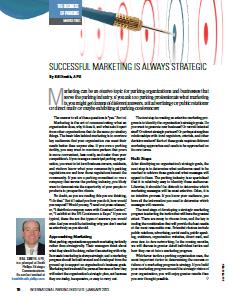Marketing can be an elusive topic for parking organizations and businesses that serve the parking industry. If you ask 100 parking professionals what marketing is, you might get dozens of different answers. Is it advertising? Or public relations? Or direct mail? Or maybe exhibiting at parking conferences?
The answer to all of these questions is “yes.” Sort of.
Marketing is the act of communicating what an organization does, why it does it, and what sets it apart from other organizations that do the same (or similar) things. The basic idea behind marketing is to convince key audiences that your organization can meet their needs better than anyone else. If you own a parking facility, you may want to convince parkers that yours is more convenient, less costly, and safer than your competition’s. If you manage a municipal parking organization, you want to let local business owners, residents, and visitors know what your community’s parking regulations are and how those regulations benefit the community. If you are a parking consultant or run a company that serves the parking industry, you likely want to demonstrate the superiority of your people or products to prospective clients.
No doubt, as you are reading this you are thinking, “I do that.” But if I asked you how you do it, how would you respond? Would you say, “I send out press releases,” or, “I distribute company news with Constant Contact,” or, “I exhibit at the IPI Conference & Expo.” If you are typical, these the are the types of answers you would offer. And you would be indicating why you don’t market as effectively as you should.
Approaching Marketing
Most parking organizations approach marketing tactically rather than strategically. Their managers think about what they should be doing, rather than starting with why. Successful marketing is always strategic, and a marketing program should be built around and developed from the ground up to support an organization’s business goals. Marketing tactics should be pursued because of how they will affect the organization’s strategic plan, not because they are flashy, inexpensive, or easy to carry out.
The first step in creating an effective marketing program is to identify the organization’s strategic goals. Do you want to generate new business? Or recruit talented staff? Or attract strategic partners? Or perhaps strengthen relationships with local regulators, officials, and other decision makers? Each of these goals requires different marketing approaches and needs to be approached on its own terms.
Next Steps
After identifying an organization’s strategic goals, the next step is to determine what audiences need to be reached to achieve those goals and what messages will appeal to them. The parking industry is so specialized that it is relatively easy to identify these audiences. Likewise, it shouldn’t be difficult to determine which marketing messages will be most effective. Often, it is an intuitive process. If you know your audience, you have all the information you need to determine which messages will resonate.
The final stage of developing a strategic marketing program is selecting the tactics that will have the greatest effect. There are many to choose from, and the key is finding the combination that will provide the best results at the most reasonable cost. Potential choices include public relations, advertising, social media, public speaking, webinars, organization websites, direct mail, and even face-to-face networking. In the coming months, we will discuss in greater detail individual tactics and how they can fit into a marketing program.
Whichever tactics a parking organization uses, the most important factor in determining the success or failure of a marketing program is strategy. If you build your marketing program around the strategic vision of your organization, you will enjoy greater results than you ever thought possible.
Bill Smith, APR, is a principal at Smith Phillips Strategic Communications.
He can be reached at bsmith@smith-phillips.com.
TPP-2013-01-Successful Marketing Is Always Strategic

